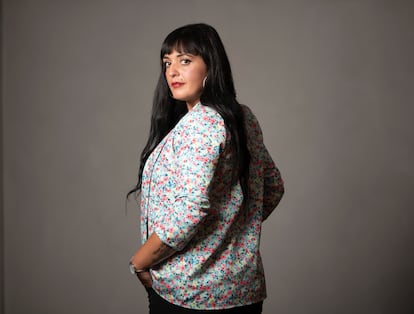Amelia Tiganus: ‘Being a whore is like a prison with invisible bars’
She escaped abuse in her native Romania and worked as a prostitute in over 40 brothels in Spain. Today, Tiganus is an activist who has just published a book about her experiences

Amelia Tiganus was born in 1984 in Galați, Romania. She escaped an abusive childhood and spent several years as a sex worker in Spain, but today she is an activist and a writer. Her book La revuelta de las putas (or The revolt of the whores) is an unflinching account of her mistreatment – a lesson, a scream and a wound in print. Tiganus can just as easily offer a clear-eyed socioeconomic analysis of the trafficking of women as recount a personal experience that makes one’s skin crawl with rage.
Question. “Whore.” You use that word with both pride and humiliation. How hard has it been to assume it with your head held high, and how hard is it not to be ashamed?
Answer. Wow, we are starting with tough questions. I find it hard to deny that identity, and I don’t want to run away from it. It can be useful for me to help break the dichotomy of “good” and “bad” women, of those who live with social recognition and those who suffer from social stigma.
Q. You say that after being abused and entering the world of pimps, you felt like a dead woman whose only way out was to know how to use her body, and that was her power: Why?
A. I’m more or less trying to explain it now. The only way out was to keep moving forward. Sexual violence does not only affect the poorest people. I had my needs covered.
Q. But you had a problem with your mother. She mistreated you.
A. Yes, she is alive and I am struggling with wanting to forgive my mother and wanting her to forgive me.
Q. You are full of paradoxes. A walking novel.
A. I’ve never been told that before, but I’m interested in that idea. I have an obvious duality there. I didn’t want to blame my mother for everything, but I didn’t want to exonerate her either. I don’t want to be a mother myself, because I’m afraid of screwing it up.
Q. You were sold by organized crime in your country for €300 to a Spanish pimp. €300!
A. Yes: €300. That money went to the person who said they would introduce me to someone else as a favor so he could fix my life in two years, which was a lie, of course. I already knew what I was getting into. You know from the beginning. But many women find it hard to admit it. Then I built up a debt of €3,000, according to them.
Q. So the amount varies, according to what’s useful for the pimp?
A. Yes, it took a long time to pay because every day I had to cover where I was staying or the things I needed for work. What you earn, you invest in being a whore: makeup, clothes, paying fines, cocaine, alcohol, because they get you hooked on that and that’s where all the money goes. You never save anything. You cheat yourself. It was a circle closing in on itself. A prison with invisible bars. It seems like you could walk away, but you don’t.
Q. And so you went from one club to another all over Spain. How many places in total?
A. I don’t know, I think I’ve been to all of Spain’s regions. It is easier to tell you where I haven’t been. I spent five years in more than 40 brothels, though I wouldn’t say that I was working because that’s not working, I would say I was passing through. Every so often they move you because you have to change the wares. And you must strive to be the best piece for them to choose. The ones who worked the hardest became the favorites. They had their privileges, of course. We all ended up wanting to be the favorite.
Q. But there came a point when you decided to break away.
A. At one point I ran away. Now I think about it and I say: thank goodness that worked out well! The hard thing to understand is how you get trapped in that system even though the door is open, and the invisible bars that make it more difficult. My way out was to call a client and tell him I was quitting. I could no longer act like the happy whore. I told him I was going to his house and if he would let me in he could fuck me for free. He said, “Oh yeah, sure!”. Then I started working as a waitress. I was able to pull through, although it was hard. For years they tell you that you’re no good for anything else. I was afraid of everything: daylight, people. But you couldn’t tell. In people’s eyes I was an aggressive girl. They saw me as really powerful when in reality I felt pure fear.
Q. Did your family know?
A. I didn’t tell them, but when I try and put myself in their shoes I think they would have sensed it. I don’t know. When I told them, my mother didn’t want to know much. We have a good relationship now, but that’s because we live far apart. Nobody could have imagined that I would decide to talk about it publicly and become an activist. I had it in me. But it took me 12 years to talk about it.
Q. You say in your book that four out of 10 Spaniards have used or currently use prostitution. Why do you think that is?
A. There are several factors. On the one hand, Spain is a gateway to Europe from the global south: Africa and Latin America. Tourism and the fact the country is synonymous with leisure also contribute. If we add to that the decriminalization of renting spaces to third parties for prostution, the country became full of brothels.
Q. So how can we put an end to this?
A. With abolition, but that does not mean prohibiting or eradicating it. First of all, by prosecuting all forms of pimping. That’s a state problem. It has to include help for those who leave, not only financial help, but also therapy and finding work. And finally to reduce the demand through education and penalization. We need rules in order to live together, and one of them is to admit that whoever exploits a woman or abuses her is affecting her health: put simply, you cannot pay for penetrating a woman because that entails harmful consequences for her. Period.
Tu suscripción se está usando en otro dispositivo
¿Quieres añadir otro usuario a tu suscripción?
Si continúas leyendo en este dispositivo, no se podrá leer en el otro.
FlechaTu suscripción se está usando en otro dispositivo y solo puedes acceder a EL PAÍS desde un dispositivo a la vez.
Si quieres compartir tu cuenta, cambia tu suscripción a la modalidad Premium, así podrás añadir otro usuario. Cada uno accederá con su propia cuenta de email, lo que os permitirá personalizar vuestra experiencia en EL PAÍS.
¿Tienes una suscripción de empresa? Accede aquí para contratar más cuentas.
En el caso de no saber quién está usando tu cuenta, te recomendamos cambiar tu contraseña aquí.
Si decides continuar compartiendo tu cuenta, este mensaje se mostrará en tu dispositivo y en el de la otra persona que está usando tu cuenta de forma indefinida, afectando a tu experiencia de lectura. Puedes consultar aquí los términos y condiciones de la suscripción digital.









































